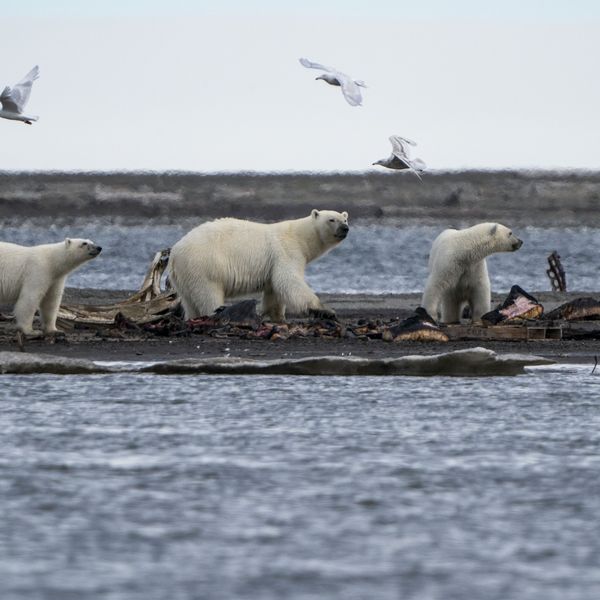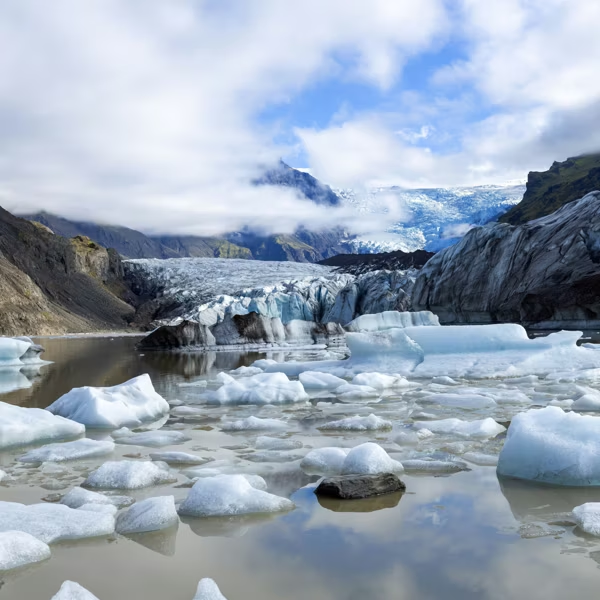Trump Administration Lobbied to Ditch Climate Language from Arctic Declaration
Draft leaked to InsideClimate News shows how the Trump administration lobbied to weaken or remove sections on renewable energy, emissions, and the Paris Agreement
Providing a disturbing look at how the Trump administration will insert its anti-climate agenda on global treaties and policy, the U.S. State Department last week aggressively lobbied the multinational Arctic Council to scrub language about global warming and renewable energy from its biennial declaration, InsideClimate News reported on Friday.
The Pulitzer Prize-winning news organization was leaked a confidential draft version of the agreement that included "track-change suggestions by the State Department's acting assistant secretary, Judith Garber."
According to the leaked draft, the U.S. State Department sought to eliminate or weaken language regarding the Paris Climate Agreement, the implementation of the United Nations Sustainable Development Goals, improving Arctic communities' access to renewable energy, and the need to reduce greenhouse gas emissions.
In one example, the U.S. successfully lobbied for the removal of the word "strongly" from the following statement: "Note with concern that the pace and scale of continuing Arctic warming will strongly depend on future emissions of greenhouse gases and short-lived climate pollutants."
President Donald Trump's Secretary of State Rex Tillerson had traveled to Fairbanks, Alaska last week to hand off the United States' two-year chairmanship of the council to Finland. At each biennial meeting, top officials from each of the eight Arctic Council nations sign a declaration establishing "the scientific and diplomatic work that was accomplished and to state the council's goals going forward," as InsideClimate News explains.
The Fairbanks Declaration was the result of three negotiations largely overseen by the Obama administration. By the third and final negotiation, "the general consensus was that the document was largely finalized." However, on May 9, Trump's State Department threw a wrench in the works.
Journalist Sabrina Shankman reports:
The group of negotiators--which includes representatives from each of the Arctic countries and from six indigenous groups that are permanent participants on the council--had planned to meet for an hour on May 10 to finalize grammar and other trivial changes. But on May 9, the negotiators received a new version of the declaration from the United States that asked for six changes--all downplaying climate risks, the need for the Paris treaty or ambitious renewable energy goals. Negotiators spent a long morning huddled around a table, working line-by-line through the document projected on a screen. The other nations challenged the U.S. on every point, often joined by the indigenous groups.
It was like the U.S. "just dropped a bomb on a multilateral forum at the last minute," one anonymous council delegate told Shankman. "I don't think any of us were mentally prepared that we were now going to be in a make it or break it situation."
The move is not surprising given the Trump administration's record of scrubbing language and data pertaining to climate change from its official websites, its policies expanding the fossil fuel industry, its persistent denial of the facts regarding humans' impact on global warming, as well as its ongoing threats to pull the U.S. from the Paris Agreement.
And as Shankman notes, the successful effort to weaken the document "can be seen as a test case for what we can expect at larger, more consequential meetings of international organizations dealing with global warming issues and policy as President Donald Trump rolls back U.S. climate policies and backslides on international commitments."
An Urgent Message From Our Co-Founder
Dear Common Dreams reader, The U.S. is on a fast track to authoritarianism like nothing I've ever seen. Meanwhile, corporate news outlets are utterly capitulating to Trump, twisting their coverage to avoid drawing his ire while lining up to stuff cash in his pockets. That's why I believe that Common Dreams is doing the best and most consequential reporting that we've ever done. Our small but mighty team is a progressive reporting powerhouse, covering the news every day that the corporate media never will. Our mission has always been simple: To inform. To inspire. And to ignite change for the common good. Now here's the key piece that I want all our readers to understand: None of this would be possible without your financial support. That's not just some fundraising cliche. It's the absolute and literal truth. We don't accept corporate advertising and never will. We don't have a paywall because we don't think people should be blocked from critical news based on their ability to pay. Everything we do is funded by the donations of readers like you. Will you donate now to help power the nonprofit, independent reporting of Common Dreams? Thank you for being a vital member of our community. Together, we can keep independent journalism alive when it’s needed most. - Craig Brown, Co-founder |
Providing a disturbing look at how the Trump administration will insert its anti-climate agenda on global treaties and policy, the U.S. State Department last week aggressively lobbied the multinational Arctic Council to scrub language about global warming and renewable energy from its biennial declaration, InsideClimate News reported on Friday.
The Pulitzer Prize-winning news organization was leaked a confidential draft version of the agreement that included "track-change suggestions by the State Department's acting assistant secretary, Judith Garber."
According to the leaked draft, the U.S. State Department sought to eliminate or weaken language regarding the Paris Climate Agreement, the implementation of the United Nations Sustainable Development Goals, improving Arctic communities' access to renewable energy, and the need to reduce greenhouse gas emissions.
In one example, the U.S. successfully lobbied for the removal of the word "strongly" from the following statement: "Note with concern that the pace and scale of continuing Arctic warming will strongly depend on future emissions of greenhouse gases and short-lived climate pollutants."
President Donald Trump's Secretary of State Rex Tillerson had traveled to Fairbanks, Alaska last week to hand off the United States' two-year chairmanship of the council to Finland. At each biennial meeting, top officials from each of the eight Arctic Council nations sign a declaration establishing "the scientific and diplomatic work that was accomplished and to state the council's goals going forward," as InsideClimate News explains.
The Fairbanks Declaration was the result of three negotiations largely overseen by the Obama administration. By the third and final negotiation, "the general consensus was that the document was largely finalized." However, on May 9, Trump's State Department threw a wrench in the works.
Journalist Sabrina Shankman reports:
The group of negotiators--which includes representatives from each of the Arctic countries and from six indigenous groups that are permanent participants on the council--had planned to meet for an hour on May 10 to finalize grammar and other trivial changes. But on May 9, the negotiators received a new version of the declaration from the United States that asked for six changes--all downplaying climate risks, the need for the Paris treaty or ambitious renewable energy goals. Negotiators spent a long morning huddled around a table, working line-by-line through the document projected on a screen. The other nations challenged the U.S. on every point, often joined by the indigenous groups.
It was like the U.S. "just dropped a bomb on a multilateral forum at the last minute," one anonymous council delegate told Shankman. "I don't think any of us were mentally prepared that we were now going to be in a make it or break it situation."
The move is not surprising given the Trump administration's record of scrubbing language and data pertaining to climate change from its official websites, its policies expanding the fossil fuel industry, its persistent denial of the facts regarding humans' impact on global warming, as well as its ongoing threats to pull the U.S. from the Paris Agreement.
And as Shankman notes, the successful effort to weaken the document "can be seen as a test case for what we can expect at larger, more consequential meetings of international organizations dealing with global warming issues and policy as President Donald Trump rolls back U.S. climate policies and backslides on international commitments."
Providing a disturbing look at how the Trump administration will insert its anti-climate agenda on global treaties and policy, the U.S. State Department last week aggressively lobbied the multinational Arctic Council to scrub language about global warming and renewable energy from its biennial declaration, InsideClimate News reported on Friday.
The Pulitzer Prize-winning news organization was leaked a confidential draft version of the agreement that included "track-change suggestions by the State Department's acting assistant secretary, Judith Garber."
According to the leaked draft, the U.S. State Department sought to eliminate or weaken language regarding the Paris Climate Agreement, the implementation of the United Nations Sustainable Development Goals, improving Arctic communities' access to renewable energy, and the need to reduce greenhouse gas emissions.
In one example, the U.S. successfully lobbied for the removal of the word "strongly" from the following statement: "Note with concern that the pace and scale of continuing Arctic warming will strongly depend on future emissions of greenhouse gases and short-lived climate pollutants."
President Donald Trump's Secretary of State Rex Tillerson had traveled to Fairbanks, Alaska last week to hand off the United States' two-year chairmanship of the council to Finland. At each biennial meeting, top officials from each of the eight Arctic Council nations sign a declaration establishing "the scientific and diplomatic work that was accomplished and to state the council's goals going forward," as InsideClimate News explains.
The Fairbanks Declaration was the result of three negotiations largely overseen by the Obama administration. By the third and final negotiation, "the general consensus was that the document was largely finalized." However, on May 9, Trump's State Department threw a wrench in the works.
Journalist Sabrina Shankman reports:
The group of negotiators--which includes representatives from each of the Arctic countries and from six indigenous groups that are permanent participants on the council--had planned to meet for an hour on May 10 to finalize grammar and other trivial changes. But on May 9, the negotiators received a new version of the declaration from the United States that asked for six changes--all downplaying climate risks, the need for the Paris treaty or ambitious renewable energy goals. Negotiators spent a long morning huddled around a table, working line-by-line through the document projected on a screen. The other nations challenged the U.S. on every point, often joined by the indigenous groups.
It was like the U.S. "just dropped a bomb on a multilateral forum at the last minute," one anonymous council delegate told Shankman. "I don't think any of us were mentally prepared that we were now going to be in a make it or break it situation."
The move is not surprising given the Trump administration's record of scrubbing language and data pertaining to climate change from its official websites, its policies expanding the fossil fuel industry, its persistent denial of the facts regarding humans' impact on global warming, as well as its ongoing threats to pull the U.S. from the Paris Agreement.
And as Shankman notes, the successful effort to weaken the document "can be seen as a test case for what we can expect at larger, more consequential meetings of international organizations dealing with global warming issues and policy as President Donald Trump rolls back U.S. climate policies and backslides on international commitments."

